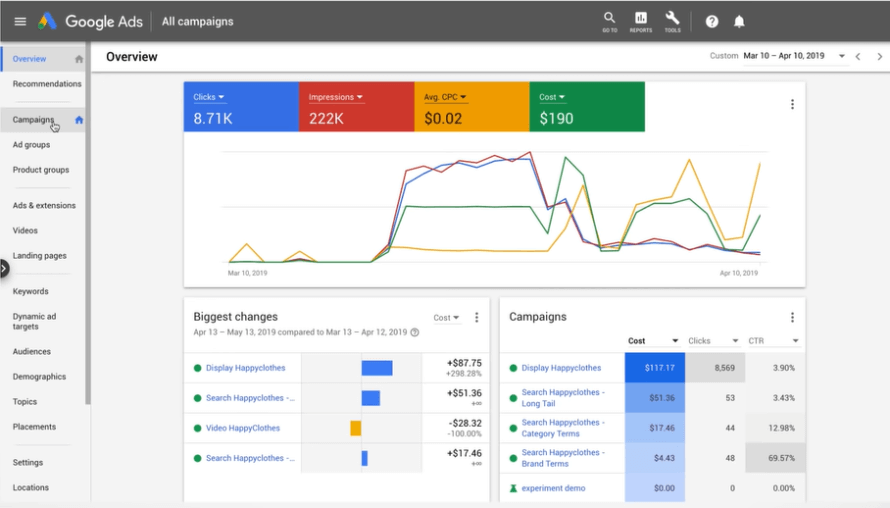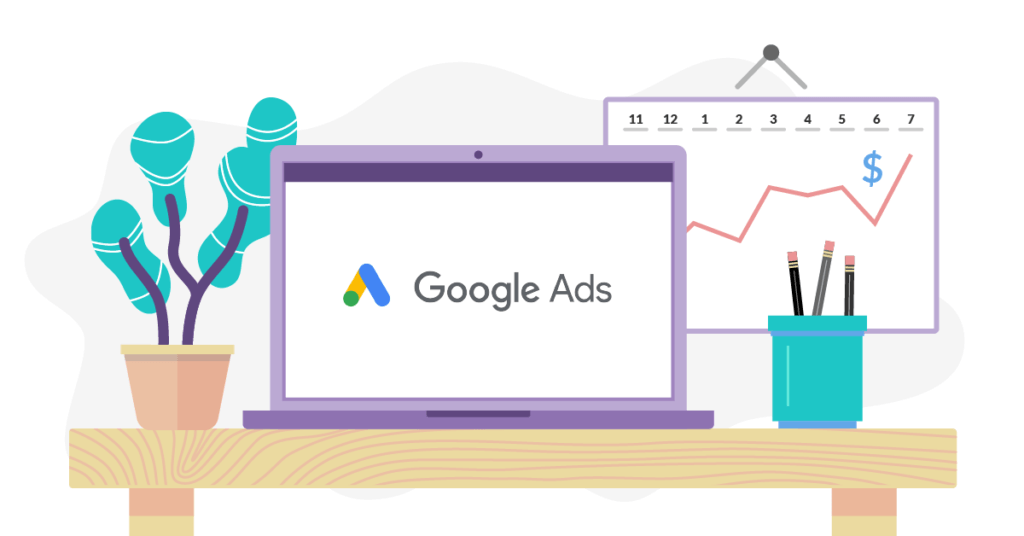Why Google Ads?
Google Adwords, which is more currently known as Google Ads, is a robust SEO strategy for your online advertising campaign that allows you to directly aim your ads toward your target audience.
Launching an effective Google Ads campaign can be difficult. Experts say it’s important to target specific audiences, build SEO-friendly webpages and ads, and constantly adjust and analyze your campaigns through Google Ads and Analytics. We connected with some of our clients to shed light on the strategies they use to develop and implement successful Google Ads campaigns.
Establishing your PPC goals
Prior to choosing keywords and pursuing a PPC campaign, it’s important to outline your objectives. What’s the purpose of running your campaign? What kind of leads do you want to attract? Establishing the kind of business you run will affect the goals your campaign needs. Some possible objectives include:
- leads
- sales
- email sign-ups
- account registrations
- booked appointments
Determining your goal will guide the rest of the campaign, including which keywords you choose.
Start by creating an ad group. This will help you gauge keywords that would best describe your business’ specialized services in an effort to attract your particular clientele.
Use the Keyword Planner Tool in Google Ads by thinking of words that will trigger your ads to appear in a search. Give it pertinent information such as your business’ name, URL and location. For example, let’s say you run an online flower delivery service that we’ll call Pete’s florist. Now, create a list of long tail and short tail keywords that your clients may use in a search such as:
- online flower delivery
- flower delivery online
- sending flowers online
- buying flowers online
- florist
- local florist
- send flowers
- Pete’s florist shop
- Pete’s florist delivery
- Pete’s florist delivery service
You can then name the ad group and save the suggestions to your Google account. You’ve now added keywords people can use to search for the items you offer. Your PPC advertising will then enable you to “bid” on key search phrases. The companies with the winning bids show up first in a search.

Expect trial and error
The entire concept behind SEO and finding the right keywords is an endeavor in trial and error. You may not see the results you want on the first try, so don’t get discouraged. Seeing differences in traffic may take months if not a year after you’ve made the necessary adjustments. However, the great thing about Google Ads is that it’s an ideal platform for testing and learning as you go.
If you decide to hire a digital marketing agency(like us), it may be able to help you establish the minimum amount of time to leave a campaign as-is to gauge its effectiveness. But all all of the guess work is eliminated by our Google Ads Experts. Allowing us to give you the most results for your money.
Capture those leads
Now it’s time to convert your prospective searchers into leads. One effective way to capture leads is by asking visitors to complete an online form. This can be done in several ways through interstitials asking them to sign up for your monthly newsletter, to create an online account or sign up for a webinar.
The form should ask for minimal information, start with three fields at the most so you don’t overwhelm your visitors.
Once you’ve started collecting lead capture data, have a streamlined internal process in place in an effort to avoid losing potential clients’ information and letting too much time go by without reaching out to them.
Appoint someone on your staff to follow up on leads to keep them on the route to conversion. Follow up with phone calls or emails, depending on which kind of contact information you collected, and nurture that lead so that your investment in your ad campaign wasn’t in vain.

Consider the marketing budget
Speaking of investment, it’s important for your business to allocate what can be conceivably afforded on PPC. You get what you pay for, meaning the maximum bid is the highest limit your business is willing to pay for a web searcher’s click for a given keyword.
Many factors go into calculating this value such as:
- Keyword research results and chosen search terms’ popularity
- Your marketing budget
- The “average spend” per client or web transaction
- The conversion rate produced by each campaign. Use the product sales formula: divide the number of site visits by visits that resulted in a sale.
You may not have much of the metrics at the beginning of a new campaign. Considering that, prepare figures based on reasonable assumptions. Once you begin to receive more data from the new campaign, you can adjust your bids accordingly.

Go local – if your business allows it
Going back to the online flower shop client above, adding the location of your business will narrow your search even further, creating an opportunity for very specific keyword searches and targeting certain customers.
Google offers Enhanced Campaigns that enable users to target consumers in particular postal codes, preventing your business from spending money on consumers who don’t live locally.
Since your company is investing in PPC, the goal is to have each click be a potential client who could provide a return on your investment. Direct your initial resources toward your immediate area, then expand your region as desired once you start to see success in your ad campaigns.
Just ensure you have the resources in place to take on additional phone calls and messages from potential customers reaching out to inquire about your business.
Conclusion
Google ads can be an effective assistant to your growth strategy, but they aren’t a magic potion. It is a skill to master effectively.
You still need to plan above before going all in. Even if aligns with your budget, a wrong Google strategy can hamper your long-term gains.
put this in quotations: Make sure you optimize your ads and look for opportunities to scale. Be thorough in your preparation and data-driven in your execution.
Having doubts? Ads aren’t working as planned? If you have any questions, feel free to reach out and our team of Google Ads experts will help!
